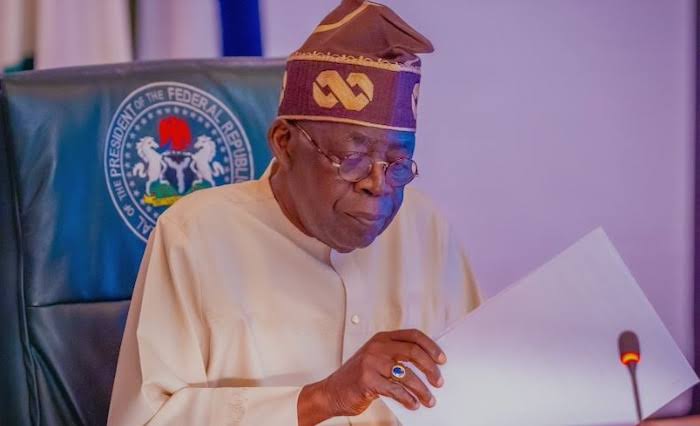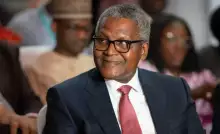President Tinubu’s cabinet reshuffle had Ogun State reportedly produced four ministers, the highest by a state in the cabinet.
In a significant cabinet shakeup during the 19th Federal Executive Council meeting at the State House, Abuja, Tinubu approved the re-assignment of 10 ministers to new portfolios, discharged five others and nominated seven new ministerial appointees for onward transmission to the Senate for confirmation.
This came as the President renamed the Ministry of Nigeria Delta Development to the Ministry of Regional Development, scrapped the Ministry of Sports Development, and merged the Ministries of Tourism and Arts and Culture to become the Federal Ministry of Art, Culture, Tourism, and the Creative Economy.
The incoming Dr Jumoke Oduwole joins Wale Edun (Minister of Finance), Dr Adekunle Salako, the new Minister of State for Health, who was previously Minister of State, Environment and Bosun Tijani (Minister of Communications and Digital Economy) as ministers of Ogun extraction.
Senate, SANs back FG
While the appointments of the four Ogun ministers raised eyebrows in some quarters, with some of the opinion that it fell short of the Federal Character criteria for appointments, Chairman, Senate Committee on Federal Character, Allwell Onyesoh (PDP, Rivers East), acknowledged that while the Federal Character was a constitutional matter, it wasn’t the sole criterion for selecting ministers and other high-level public office holders.
He said, “Yes, Federal Character is an important issue, and I am sure the President would not want to go against the Constitution. However, what the Constitution states is that one person per state, so, once that has been met, I am not sure there should be an issue.”
Senator Onyesoh added, “The Federal Character isn’t the only requirement; we need competent people. The Constitution also empowers the President to be proactive, which means he is allowed to bring efficient people on board to do their jobs.
“Why are people so critical of this administration? It wasn’t the same for the previous administration.”
The criticisms come as Ministers vehicles reduced President Tinubu on Thursday restricted Ministers, Ministers of State, and Heads of Agencies of the Federal Government to a maximum of three vehicles in their official convoys.
“No additional vehicles will be assigned to them for movement,” the President affirmed in a statement he signed Thursday titled, ‘President Tinubu issues new directives on reduction in cost of governance.’
Special Adviser to the President on Information and Strategy, Mr. Bayo Onanuga, who released the statement, said, “The cost-cutting measure was announced today (Thursday) in a statement signed by the President.”
In January 2024, Tinubu issued a directive, which the presidency said was to reduce government expenditure.
The directive included reducing his entourage on foreign trips from 50 to 20 officials.
For local trips, he reduced it to 25 officials.
Similarly, he reduced the Vice President’s entourage to five officials on foreign trips and 15 for local trips.
In the directive, Tinubu also ordered all ministers, ministers of state, and heads of agencies to have at most five security personnel attached to them.
“The security team will comprise four police officers and one Department of State Services officer.
“No additional security personnel will be assigned, he ordered,” the statement read.
The Presidency said, “All affected officials are expected to comply with these new measures immediately, underscoring the urgency and seriousness of these changes.”
A former President of the Nigerian Bar Association, Dr. Olisa Agbakoba (SAN), also said there was no law that stopped the Nigerian President from appointing more than one minister from a state.
Agbakoba said it was the president’s prerogative to appoint any number of persons from a state to serve as ministers.
Agbakoba, who spoke to one of our correspondents via the telephone on Thursday, stated that the only restriction was that the ministers must be appointed across all 36 states.
“That’s the only restriction,” he said. So, one may say, why four? But nothing stops the President from appointing even 10.
“There’s no law that says he can’t appoint more than one. The only thing the law says is that he must appoint one person from each state on the principle of federal character so that every state feels included. The point is, are all 36 states not represented in the cabinet? The minimum requirement is that there has to be one minister from all 36 states.”
Another Senior Advocate of Nigeria, Ebun-Olu Adegboruwa, explained that the constitution stipulated that in appointing ministers, each state of the federation must have representatives.
He added that even though there was no requirement for equality in the number of ministers, the situation where one state had four ministers and another had only one was not good enough.
“I think that the situation whereby one state has four ministers and another state has only one does not augur well for inclusivity, for equity, and for justice. And in this particular instance, the government is saying that we should run an economy that is new and budget-friendly.
“So, to then bloat the ministers list by picking four people from a particular state is to give the impression that there are no people from other states,” he said.
“This current government should not replicate the errors of the past. I believe that if somebody is elected from a particular region, he should carry other regions along so that we can reduce the agitation for separatism, agitation for autonomy, and agitation for secession as being advocated by other sections of the country that are marginalised,” he said.
In his response, Niyi Akintola (SAN) said the position of Section 14 was very clear, as the general rule was to give each state one minister.
He said, “The President is bound to work very hard to ensure that each state gets one minister. And there is no state legally that doesn’t have one minister.
He further stated that the duty of the president was to ensure that no state should be without a minister.
“I am from Oyo State, and we have only one minister and we are not complaining. Can you point out one state in Nigeria that doesn’t have a minister? One minister from Plateau State resigned and he was replaced with another one.
“I don’t know why people make noise where there are no issues, we should look at if he breached the Constitution, to me these are not issues,” he said.
Another senior Advocate of Nigeria, Wolemi Esan, said there was no restriction against a state having more than one minister.
Esan cited Section 147(1) of the 1999 Constitution (as amended) that states that the President must appoint at least one minister from each state, who must be an indigene of that state.
“The Constitution specifies a minimum number of ministers per state but does not set a maximum. “Therefore, strictly speaking, there is no restriction against a state having more than one minister. “However, section 14(3) of the Constitution emphasises that the composition of the Federal Government should reflect the Federal Character, ensuring that there shall be no predominance of persons from a few states in government,” he said.
However, Prof Mike Ozekhome (SAN) added that to appoint four ministers from Ogun, one of the smallest states in Nigeria, was against the provisions of the Constitution, particularly Section 141, Section 153 and Section 71 of the Third Schedule, Part One of the Constitution of the Federal Republic of Nigeria, 1999.
According to him, all these sections deal with the principles of federal character, and they emphasise that Nigeria shall be a state based on the principles of democracy and social justice.
“So, by appointing one minister to join the three old ones, making four from Ogun State, the President has breached Section 14(3) of the 1999 Constitution because he has appointed four people from the same state, Ogun, and from the same ethnic group of Yoruba, which is against the Constitution.
“By the way, the question must be asked, whether the team carrying the ministerial lists has actually done anything to change the status quo. I think not. What I’ve seen, what I saw, is against what Nigerians were expecting. We were expecting an earthquake of change in the cabinet because many of the ministers have shown themselves to be indolent and to be non-performing.
“Now, what we saw, the only ministry I believe that the President did very well is the ministry of the Niger Delta, because he tried to stop wastages by bringing the Niger Delta Development Commission, the Northeast Development Commission, the Southwest Development Commission, and the Southeast Development Commission.
“All of them brought under the Ministry of Regional Development. But I believe that the Niger Delta, Northeast Development, and Southwest were drainpipes where money was being guzzled into.
“But by removing them and collapsing them under the Ministry of Regional Development, I believe that some money would be saved there. But I would think that it should have gone far.
He further stated that many of the present ministries were not functional.
“Why would you have a different ministry for agriculture than another one for water resources? Why not collapse some of these ministries and name it the Ministry of Agriculture, Water Resources and Rural Development? What is the difference between the Ministry of Environment and the Ministry of Blue Economy? Why don’t you collapse them? Blue Economy, where you are having fish, environment, where you also have fish and other things, why don’t you collapse them? Why would the President even introduce a new ministry of animal husbandry or cattle rearing? What is the meaning of that? Why don’t you just put that word quietly under the Ministry of Agriculture?
“So, I believe the President should go far, very far, in rejigging his cabinet, which for now is a drain pipe for the nation’s bigger resources.”
Niger Delta kicks
Tinubu’s new appointments were also met with scathing criticisms by a section of the polity with Second Republic Senator and leader of the Pan-Niger Delta Forum, Chief Edwin Clark, accusing the President of behaving like his predecessor, Muhammadu Buhari, by making lopsided appointments.
The Ijaw leader on Wednesday called on Tinubu to rescind his decision in the scrapping of the Ministry of the Niger Delta Affairs in a swift response to the announcement.
On Thursday, the Ijaw leader, who spoke via telephone at the Special General Assembly of the Pan Niger Delta Forum in Port Harcourt with the theme, ‘Fostering Peace and Unity for Sustainable Development of the Niger Delta Region’, expressed sadness that despite public outcry about inequality and marginalisation in the country, Nigeria was still sharply divided along religious and ethnic lines.
He stated, “Nigeria is divided across the lines of ethnicity, along the lines of religion, hunger, and everything that you can think of. Today Nigeria no longer has a middle class. The wealthy have carried away the wealth.
“They seize our oil wells. So we are nowhere. Can you imagine a man like me two, three years ago, if I wanted anything from the oil companies? From the oil industry, I had to travel to Daura (the hometown of former President Mahammadu Buhari) to meet with Mr. President, who would then grant me?
“What type of country do we belong to, a country where we have no respect for one another? They think it is right. And this is still continuing.”
On the scrapping of the Ministry of Niger Delta, Clark added, “Today they declare us arrogant when we ask for our rights. Could you imagine that I was sleeping last night when I woke up to see that they had scrapped the Niger Delta Affairs Ministry?
“It didn’t come to me as a surprise because when they did it the first time they were hardly in office. Up until now, they didn’t provide an investigation. They have provided nothing. So, scrapping it now means nothing to us.
“We (Niger Delta) must work together if we must survive in the country. Who owns this country more than yourselves, nobody? Every country has what God has given to that country to be a powerful country. We, the people of the Niger Delta, are Nigerians; we must fight for Nigeria.
“We should not allow anyone who cannot manage people’s diversity, who believe that once they are in power their people must take over, our people must be suppressed. Former President Muhammadu Buhari did it.
“He (Buhari) said the Fulanis are the only Nigerians. Every office was headed by a Fulani or Hausa. And today most of these things are being repeated by President Tinubu. In doing so, he has followed the pattern of his predecessor in office. Where are we? We produce the oil; produce everything.”
Meanwhile, the Federal Government has said the Ministry of the Niger Delta Affairs was expanded and not scrapped, as reported in some sections of the media.
The Minister of State for Petroleum Resources, Senator Heineken Lokpobiri, stated this at the PANDEF event.
He said, “It is very important to use this opportunity to explain that I was at the Federal Executive Council meeting when that decision was taken on the issue of the Niger Delta Ministry.
“The Ministry was not scrapped at all. It was rather expanded to coordinate all regional development agencies. Apart from the NDDC, there is nothing stopping the South-South Region from getting the South-South Development Commission.
“And I think something like that has already gotten to an advanced stage. So the Ministry for Regional Development will coordinate not just the NDDC; it will also coordinate if there is any South-South Development Commission; it will coordinate that. It will coordinate North-East, it will coordinate South-East, and it will coordinate all regional development under the leadership of your own son.
“Your own son is still the leader. We must understand that point. I want to use this medium to explain to you that we have nothing to lose at all. We are in fact losing nothing. Rather, we may gain more if we have the South-South Regional Development Commission.”
He added, “Let me also say this to you: the Niger Delta until tomorrow is considered the most strategic region in the country, and the President acknowledges that. Some of the very steps that we are taking today will benefit people of the Niger Delta more than others.
“Sometimes when you are making very bold decisions, people may feel anxious. But that is the price we need to pay to get to the Promised Land.
“You recall that as of today there is more money for states and local governments and not for the federal government. It is also important to state here that my leaders don’t hold the federal government accountable alone. The time has come for every tier of government to pay its own share of the development of the Niger Delta.
“Last month, the three tiers of government shared about N1.3tn. Some of our states got N50bn, N60bn. It is time for PANDEF not to look at what it can get from the Federal Government alone. But see how we can challenge our local government now that there is local government autonomy.
“Local governments are also getting N600m, N800m. Yes, local governments, and I say some of these things we complain about could very well be done by local governments, but because everybody is looking at the Federal Government, we have given people their honeymoon for too long. Let that honeymoon end now.”
Speaking, Rivers State Governor, Siminalayi Fubara, said the Niger Delta region had a burden in its hands to advocate for stronger institutions in the federation.
Fubara, who was represented by his Commissioner for Budget and Economic Planning, Prof. Peter Medee, said, “Instead of stronger individuals, we have produced stronger individuals from this region and from several regions, yet the development of our region as well as to be able to plough back the benefit and the resources of our region to use it to produce and get the economy of our region to develop has suffered.
“So as you gather here today in the General Assembly to be able to articulate and plan. We will discuss further the need for unity, peace, and the development of our state. I call on all of you to use the unity in our diversity to our advantage.”
He added, “A lot of other regions are taking advantage of our disunity to divide us further. The time has come, especially now, when the governors of our respective states have taken it as a point of sincere commitment and dedication to unite the region. You, as leaders of the region, take advantage of the opportunity to discuss and come up with issues that will lead to our regional development.”
In his message, former Governor of Akwa Ibom State, Obong Victor Attah, expressed sadness over the scrapping of the Niger Delta Affairs Ministry.
“I felt a bit offended, if I can use that word, that the Ministry of Niger Delta that we fought so hard to have established alongside the Niger Delta Development Commission should be abolished without any notice to any of us. And nobody knows what really that means for our development,” Attah said.
“We are now going to come under a commission for regional development. Quite some time ago, I remarked that maybe the name NDDC was wrong because Niger Delta is a defined geographic area.
“Nobody doubts the boundaries of the Niger Delta. But suddenly NDDC was scheduling for Imo, Abia or everybody that had oil. So, I asked, ‘Why don’t we go back to OMPADEC (Oil Mineral Producing Areas Development Commission)?’
“Bring just the oil-producing areas commission, rather than pretend that it is a commission for developing the Niger Delta. I think, as defined in the President’s address, as a treasure trove of this country, we should have a lot to say about what happens to the treasure of this country.”





